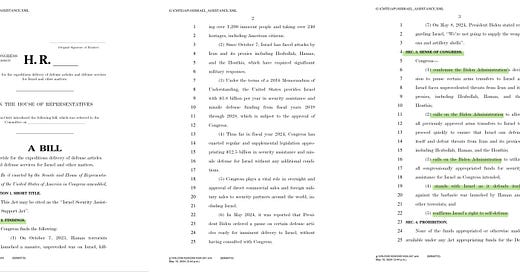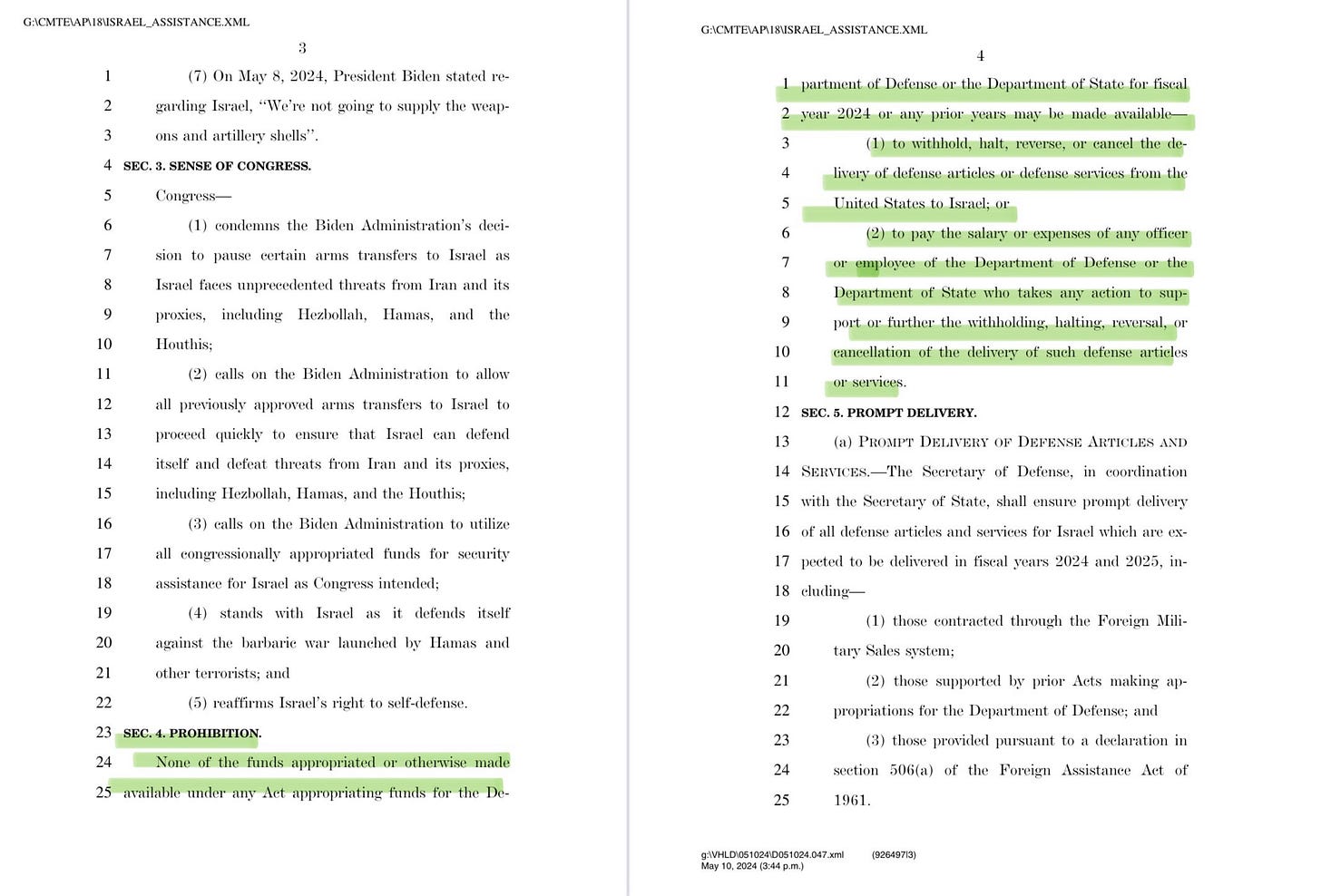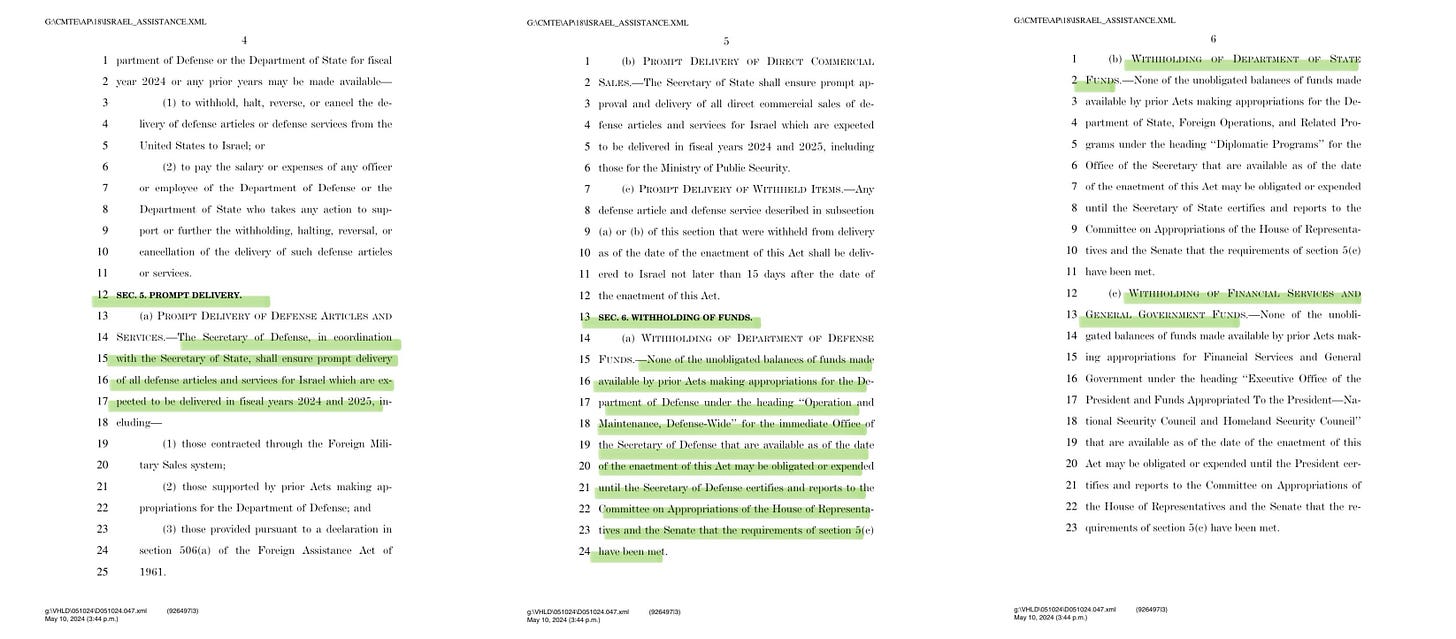Short bill, lots of lessons
Lots to learn about power and politics in a simple House bill this week
The House schedule for the week published by the Majority Leader includes a measure called the Israel Support Assistance Act. A short bill—it's only 8 pages long. But it contains a lot of provisions that exemplify different aspects of congressional policy making, oversight, and politics.
In an email this morning, Punchbowl described the measures as a “non-binding resolution,” but that’s incorrect.
In reality, the measure is a bill that contains major policy provisions that, if enacted into law, would have significant consequences for current administration policy toward the Israel-Hamas war. It’s extremely unlikely to become law, but it does a nice job of showing off some of the power of the purse tools Congress has to control policy in the executive branch.
So let’s dig-in and take a look at it.
Sec 1-3. Title, Findings, and Sense of Congress
The first three pages of the bill (section 1, 2, and 3) are straightforward and—as Punchbowl described—nonbinding as policy. Section 1 provides for the title of the Act. Section 2 describes Congress’ “findings,” and Section 3 is a “Sense of Congress” statement that condemns the Biden administration for pausing certain military transfers to Israel, calls on them to complete the transfers, and reiterates support for Israel.
So-called “Sense of Congress” provisions are a particular form of a larger class of legislation in Congress often referred to as “messaging bills/resolutions.” Most messaging bills are actually substantive measures that are not intended to be approved; Members introduce lots of bills and resolutions every Congress simply for the purpose of showing their support for a particular policy idea or issue, with no intention of do anything else to try to get the legislation passed.1 These messaging bills never hit the House floor; their intended for constituent consumption.2
A second type of messaging bill is one produced by a party with the intention of being passed in one chamber, but with little or no expectation of it even begin taken up in the other. In the divided 118th Congress, these are commonplace. Much of what House Republicans have done this year can be put into this category, most notably the immigration provisions in H.R. 2 and the Israel aid that was tied to IRS cuts.
Nonbinding “Sense of the House” or “Sense of Congress” messaging bills are slightly different in that they are intended to be approved, but serve as messaging vehicles because even if they are approved there is no policy change. They are simply statements of the position of the chamber. As such, they can be passed as resolutions (either H.Res or S.Res or concurrent H.Con.Res/S.Con.Res) and do not require the signature of the president.
In fact, the House Republicans have two such measures on the agenda for this week: H.Res. 1213 “regarding violence against law enforcement,” and H.Res.1210, “condemning the Biden border crisis, and the tremendous burdens law enforcement officers face as a result.” This is part of a larger House GOP focus this week on law enforcement. The latter measure is obviously partisan, given its title. How do we know the former one likely is? Because it’s slated to come up under a rule in the House, rather than via the suspension calendar.
Party messaging in Congress is important because it seeks to affect public sphere politics. What you are trying to do is shape the public understanding of political problems and political actions. Often, you don’t need to change anyone’s mind about political issues to win elections or pass legislation; instead, if you can convince the public sphere that your issues are the most important, you win because you set the agenda.
Issues that tend to unite your party and divide the opposition tend to be good for you. Issues that tend to divide your party and unite your opposition tend to be bad for you. This is why Republicans want to talk nonstop about the border and why Democrats want to talk nonstop about abortion. Those are winning issues for them right now in the public, and they also happen to divide the opposition badly.
The Republicans also believe Israel falls into this category. The Israel Support Assistance Act has “sense of Congress” provisions in it, and House Republicans might hope that those nonbinding belief statements divide the Democrats and help highlight those divisions in public. However, the bill slams Biden in a way that will likely allow the Democrats to stay (mostly) united. If they just wanted to divide the Dems, they could have gone with a basic “support for Israel in the war” resolution that the left wing progressives might have voted against.
Instead, this bill might divide the Dems on the other end. Because it’s mostly not about support for Israel, but about disagreement with the administration decision to withhold certain weapons from Israel. That might also divide the Dems, with most Dems backing the administration, but some moderates siding with the GOP. Fair enough.
But this measure is not a simple non-binding resolution. It’s a bill. It will never pass the Senate and, even if it did, Biden would likely veto it.
But it has to be a bill. Because it substantively attempts to alter both appropriations and administration policy.
Sec 4. Appropriations Limitation Provision
Section 4 of the bill puts a limitation on what the administration can do with FY24 or FY25 appropriations for the Departments of Defenses or State. Specifically, it blocks the use of any money appropriated for those agencies to be used to “withhold, halt, reverse, or cancel” the delivery of weapons to Israel, and also blocks appropriations to pay the salary of anyone who takes action to do those things. This is a direct response to the administration’s announcement regarding the withholding of weapons for Israel under certain conditions.
This technique—known in the world of appropriations as a limitation provision, or limitation rider—is one of the most common ways Congress exercises the power of the purse, essentially allowing Congress to make policy through the appropriations process. While the executive branch may have the authority to do something, if they are specifically barred from using any appropriated funds to do so, the authority is almost useless.
While many people think of the power of the purse as a positive power of Congress, allowing them to fund priorities as they see fit, its more powerful form is negative: the ability to specifically limit, or completely bar, the use of funds. In general, there are three types of limitations that Congress can put on an appropriation: duration, scope, and amount. The first two are well-known; Congress passes annual appropriations bills, requiring the executive branch to return each year to justify further spending, and Congress circumscribes the use of those funds by offering specific conditions on their use.
But the third type of limitation—the ability to limit the amount of funds, and specifically to limit the amount to $0—is the most powerful. Dozens upon dozens of such limitation provisions can be found in appropriations acts each year. Many high-profile congressional policies, ranging from the detention of prisoners at Guantanamo Bay to the use of the F-35 by the Air Force, are continued annually by using appropriations acts to specifically block any funding from being used to implement alternative lines of policy. The Vietnam War was ultimately ended when Congress specifically barred the use of appropriations for any military activity in Southeast Asia.
Using limitation provisions in general appropriations bills also gives Congress packaging leverage in negotiations with the president. While the president might veto a stand-alone bill that prohibited a given policy, appropriations bills by their very nature are omnibus actions, providing money for a large range of activities across a variety of unrelated policy areas. As the president can only sign or veto a bill in total, Congress can use limitation provisions in combination with spending priorities the president desires to force him to accept some things he doesn’t like as part of an overall package.
Sec 5-7. Appropriations Fencing Provisions
Sections 5 through 7 of the bill seek to ensure prompt delivery of all weapons to Israel. Most of section 5 (subsection (a) and (b)) simply demand that the Secretaries of Defense and State ensure that any defense articles or services slated for delivery to Israel in FY24 or FY25 be delivered promptly. Subsection (c) additionally demands prompt delivery within 15 days of anything withheld by the date of enactment.
There’s no real mechanism in the bill to enforce subsections (a) or (b), but there is a clear one in Section 6 to enforce section 5(c), and it’s what know as a fencing provision, which is a particular kind of appropriations limitations amendment.
Whereas a normal limitation amendment provides that none of the funds from an appropriations act may be spent on a particular purpose, a fencing provisions provides that certain funds cannot be spent until certain conditions are met. In this case, the money that cannot be spent until the conditions are met are certain expenditures of the Office of the Secretary of Defense, the Office of the Secretary of State, and the National Security Council and Homeland Security Council in the Executive Office of the President. And the condition that has to be met is the relevant Secretaries and the President given written confirmation that the terms of section 5(c) regarding the withheld deliveries has been met.
This isn’t as quite as blunt as a fencing provision that turns off funding for the air conditioning in an agency-heads office until they alter a policy, but it’s basically the same thing. Reverse your decision or lose the funding for your office.
Section 7 of the bill tries to force the Secretaries to obligate remaining unobligated balances of appropriations within 30 days, but I’m skeptical that this provision is enforceable, as it doesn’t have a clear enforcement mechanism associated with it if it is ignored by the executive branch.
Sec 8. Reports
The last section of the bill—section 8—provides for a classic oversight technique in Congress: requiring the executive branch to submit a report on what the hell is going on. In this case, there are several required reports:
first, a report from the Inspectors General of DoD and State on what actually happened in terms of the withholding of of defense articles or defense services to Israel;
second, ongoing reports every 30 days to relevant congressional committees detailing support given to Israel, including lists of defense articles and services; and
finally, a third report due in 30 days detailing urgent and high priority defense article and services for Israel, and steps taken or planned to expedite delivery of them.
None of this is going to happen, but…
There is almost zero chance this legislation will ever become law. It almost certainly won’t pass the Senate and, even if it did, Biden would almost certainly veto it.
And the House Republicans know this: it’s a messaging bill, designed to show their anger toward the administration and hopefully divide the Democrats into some infighting, all on an issue that the Republicans believe helps them and they want to keep front and center in the public sphere.
But this is also an example of how Congress can get tough with the power of the purse. Limitation amendments, fencing provisions, and oversight requirements are powerful tools for a legislature to control executive branch behavior, or to just saber-rattle and get executive branch policy to change preemptively.
Indeed, if a Member of Congress told you they introduced legislation on a particular issue, that’s definitely an indication that they agree with the policy in the bill, but almost no indication about how much they care about the legislation. Introducing a bill is a very easy and something any Member can do unilaterally. Often Members introduce them just to show particular constituent/interests groups that they stand with them, or just to get the groups off their backs.
This doesn’t mean such messaging bills are worthless. In fact, in my view they serve a pretty important purpose in a democracy. Members go on record with positions that everyone can see, including the public, interest groups, and future opposition candidates.








